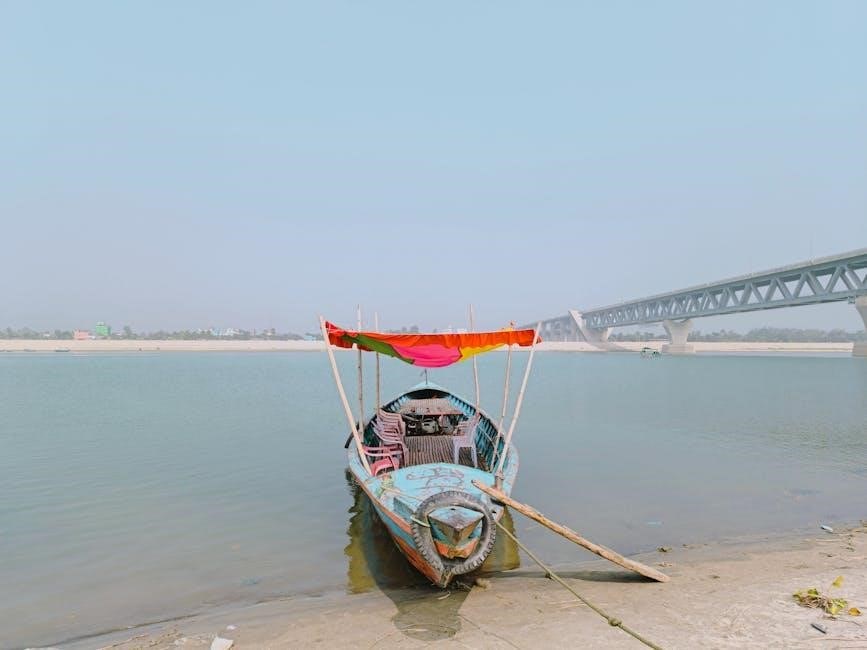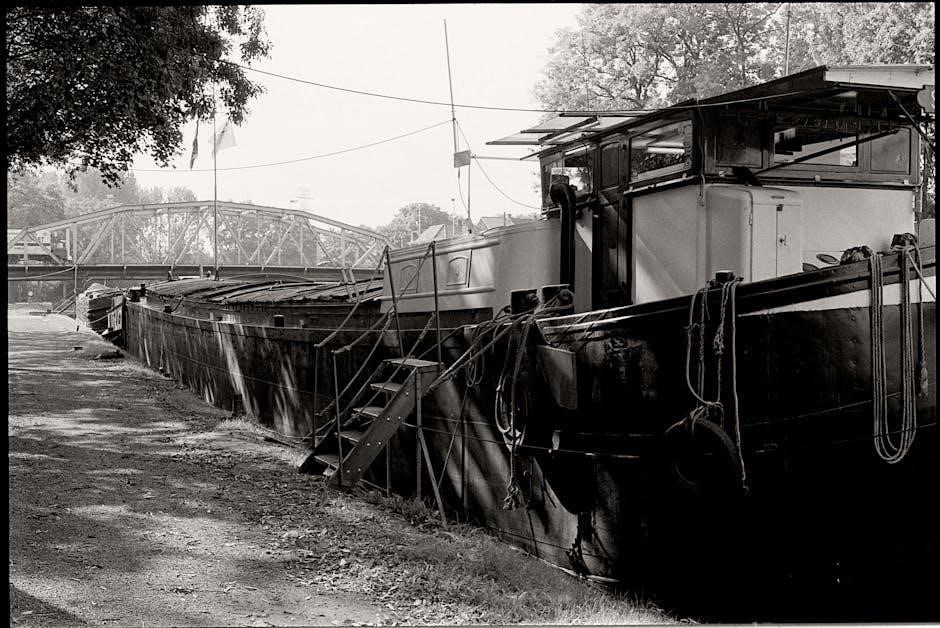
Homer’s Odyssey, an ancient Greek epic poem, follows Odysseus’s journey home after the Trojan War. Translated by Robert Fagles, it offers a poetic rendition of heroism, adventure, and human struggles, making it a timeless classic. With an introduction and notes by Bernard Knox, the Penguin Classics edition (ISBN 978-014-026886-1) remains a popular choice for readers and scholars alike, blending literary beauty with accessibility.
1.1 Overview of the Epic Poem
The Odyssey, an epic poem attributed to Homer, recounts Odysseus’s ten-year journey home to Ithaca after the Trojan War. Comprising 24 books, it explores themes of perseverance, loyalty, and divine intervention. The narrative weaves between Telemachus’s quest to find his father and Odysseus’s trials, including encounters with mythical creatures and gods. Robert Fagles’ translation captures the poem’s poetic essence while maintaining clarity, making it accessible to modern readers. The Odyssey remains a cornerstone of Western literature, offering timeless insights into human resilience and fate.
1.2 Historical Context and Significance
The Odyssey, an ancient Greek epic poem, is traditionally attributed to Homer and dates back to the 8th century BCE. It captures the cultural and religious values of archaic Greece, reflecting themes of heroism, fate, and divine influence. As a foundational text of Western literature, it has profoundly shaped storytelling and literary themes. Robert Fagles’ translation brings this timeless narrative to modern readers, preserving its poetic beauty while enhancing accessibility. The Odyssey’s enduring relevance underscores its historical and literary significance, continuing to inspire new adaptations and interpretations.
Robert Fagles and His Translation
Robert Fagles, a celebrated classicist, translated Homer’s Odyssey with poetic brilliance, balancing fidelity to the original with modern accessibility. His work earned the PEN/Ralph Manheim Medal.
2.1 Who is Robert Fagles?

Robert Fagles was a renowned American classicist and translator, best known for his poetic translations of ancient Greek texts. He held a Ph.D. in English from Yale University and taught at various institutions, including Princeton. Fagles’ work is celebrated for its lyrical quality and faithfulness to the original texts. His translations of Homer’s epics, including the Iliad and The Odyssey, have been widely praised for their accessibility and literary excellence. His contributions to classical literature earned him the PEN/Ralph Manheim Medal in 1997.
2.2 Unique Features of the Fagles Translation
Robert Fagles’ translation of The Odyssey is celebrated for its poetic and lyrical style, balancing fidelity to Homer’s original text with modern readability. His use of blank verse captures the epic’s grandeur while maintaining accessibility. The translation preserves key themes and motifs, such as the hero’s journey and divine intervention, making it both scholarly and engaging. Fagles’ work is enhanced by Bernard Knox’s insightful introduction and notes, providing context and depth for readers. This blend of artistry and scholarship makes his translation a standout in classical literature.

The Significance of the Fagles Translation
Robert Fagles’ translation of The Odyssey is renowned for its poetic style and accessibility, making Homer’s epic resonate with modern readers while preserving its ancient essence and depth.
3.1 Comparison with Other Translations
Robert Fagles’ translation of The Odyssey is often compared to other notable translations, such as those by Fitzgerald, Lombardo, and Lattimore. Fagles is praised for his poetic style, which balances artistic expression with fidelity to Homer’s original text. While Fitzgerald’s version is more literal, Lombardo’s is celebrated for its clarity and directness, particularly in audiobook formats. Fagles, however, stands out for his ability to evoke the epic’s emotional depth and grandeur, making his translation a favorite among readers seeking both readability and literary richness.
3.2 Why Fagles’ Translation is Popular
Robert Fagles’ translation of The Odyssey is widely popular for its poetic yet accessible language, balancing artistic expression with fidelity to Homer’s original text. Its readability and emotional depth resonate with both general readers and scholars. The Penguin Classics edition, featuring an introduction by Bernard Knox, enhances its appeal. Fagles’ ability to evoke the epic’s grandeur while maintaining clarity makes his translation a preferred choice for those seeking a rich, engaging experience of Homer’s timeless masterpiece.
Structure of the Odyssey
The Odyssey, comprising 24 books, chronicles Odysseus’s journey home, blending his travels with events in Ithaca. Fagles’ PDF translation masterfully presents this epic structure, enhancing reader accessibility.
4.1 Books 1-24: A Journey Home
The Odyssey, divided into 24 books, traces Odysseus’s perilous journey home to Ithaca after the Trojan War. Books 1-4 focus on Telemachus’s search for his father, while Books 5-12 recount Odysseus’s adventures, including encounters with Cyclops, sirens, and whirlpools. Books 13-24 depict his return, as he confronts suitors vying for Penelope’s hand and reclaims his kingdom. Fagles’ translation captures the epic’s emotional depth, blending action and introspection in a masterpiece of storytelling.
4.2 Key Themes and Motifs
The Odyssey explores universal themes such as perseverance, loyalty, and the struggle between fate and free will. Odysseus’s journey symbolizes humanity’s resilience against adversity, while Penelope’s unwavering fidelity embodies timeless devotion. The motif of disguise, particularly through Athena’s interventions, highlights cunning and identity. Fagles’ translation masterfully captures these elements, enriching the narrative’s emotional and philosophical depth. These themes resonate across cultures, making the epic a cornerstone of literary exploration and reflection.
Major Characters in the Odyssey
The Odyssey features iconic characters like Odysseus, the cunning hero; Penelope, his loyal wife; Telemachus, their determined son; Athena, the guiding goddess; and the Suitors, symbolizing greed and chaos. Fagles’ translation vividly portrays their complexities, making their journeys and struggles relatable and timeless.
5.1 Odysseus: The Hero’s Journey
Odysseus, the cunning king of Ithaca, embarks on a perilous decade-long journey home after the Trojan War. Faced with divine interventions, mythical creatures, and internal struggles, he exemplifies resilience and intelligence. His odyssey, as vividly captured in Fagles’ translation, is a testament to human endurance, blending heroism with vulnerability. The PDF version of Fagles’ Odyssey offers readers a seamless way to explore Odysseus’s transformative quest, highlighting themes of identity, fate, and the human condition.
5.2 Penelope: The Loyal Wife
Penelope, Odysseus’s devoted wife, embodies loyalty and cunning. While awaiting her husband’s return, she cleverly withstands the suitors by weaving and unraveling a burial shroud. Her steadfastness mirrors Odysseus’s perseverance, making her a pillar of strength. In Fagles’ translation, her character shines through, highlighting her emotional depth and strategic intellect. The PDF version of the Odyssey captures her nuanced role, illustrating her as a symbol of fidelity and wisdom, essential to the epic’s narrative and themes of endurance and devotion.
5.3 Telemachus: The Son’s Quest
Telemachus, Odysseus’s son, embarks on a journey to discover his father’s fate, driven by Athena’s guidance. Initially overshadowed by his mother’s suitors, he gains courage and travels to Pylos and Sparta, seeking news of Odysseus. His quest reveals his growth from a passive youth to a determined leader. In Fagles’ translation, Telemachus’s emotional and moral development is vividly portrayed, highlighting his struggle to emulate his father while forging his own identity. His journey symbolizes the passage from innocence to adulthood, resonating deeply in the epic narrative;

5.4 Athena: The Goddess’s Role
Athena, the goddess of wisdom and war, plays a pivotal role in Odysseus’s journey, often intervening to aid him and his son, Telemachus. She embodies strategic thinking and divine guidance, orchestrating events to ensure their survival and triumph. In Fagles’ translation, her wisdom and influence are vividly captured, showcasing her as a protector and mentor. Athena’s interventions highlight her importance in the epic, symbolizing the power of intellect and divine favor in overcoming adversity. Her character underscores the interplay between mortal and divine forces in the Odyssey.
5.5 The Suitors: Their Significance
The Suitors, over 100 men, converge on Odysseus’s palace, vying for Penelope’s hand in marriage, believing Odysseus is dead. They exploit the royal household, consuming resources and creating chaos. Their arrogance and disrespect symbolize the social disorder in Odysseus’s absence. Athena and Zeus condemn their actions, setting the stage for their downfall. The Suitors’ fate—slaughtered by Odysseus upon his return—serves as a testament to justice and the restoration of moral order, highlighting their role as antagonists in the epic narrative.

Cultural and Literary Impact
Homer’s Odyssey has profoundly shaped Western literature, inspiring countless works and becoming a cultural touchstone. Its themes of perseverance and identity resonate universally, influencing art, film, and language, ensuring its enduring relevance in modern society.
6.1 Influence on Western Literature
The Odyssey is a cornerstone of Western literature, shaping themes, motifs, and character development across centuries. Its exploration of perseverance, cunning, and destiny has influenced works from Shakespeare to James Joyce. Fagles’ translation enhances accessibility, ensuring the epic’s timeless themes resonate with modern readers. The poem’s archetypes, such as the hero’s journey, continue to inspire authors, filmmakers, and artists, cementing its role as a foundational text in the literary canon and a source of enduring cultural narratives.
6.2 The Odyssey in Popular Culture

The Odyssey has deeply influenced popular culture, appearing in films, music, and literature. Works like the Coen brothers’ O Brother, Where Art Thou? draw inspiration from Odysseus’s journey. Artists such as Adele and Lupe Fiasco reference Odysseus in their songs, highlighting the epic’s universal themes. Even TV shows like The Simpsons and Star Trek feature episodes mirroring Odysseus’s adventures. The Fagles translation, with its poetic clarity, has further amplified the Odyssey’s presence in modern media, making its timeless story relatable to new audiences.

The Odyssey PDF by Fagles
The Odyssey in PDF by Robert Fagles is a sought-after format for its accessibility and poetic clarity. Fagles’ translation captures Homer’s epic tale vividly, making it a timeless favorite.
7.1 Why the PDF Format is Popular
The PDF format of Fagles’ Odyssey is highly popular due to its portability and ease of access. Readers can easily download and carry the entire epic on digital devices, ensuring convenience. The format preserves the poetic structure and readability of Fagles’ translation, making it ideal for both academic and casual reading. Additionally, PDFs are widely compatible across devices, enhancing accessibility and fostering a seamless reading experience for modern audiences.
7.2 How to Access the Fagles Translation PDF
The Fagles translation of The Odyssey in PDF format can be easily accessed online. Platforms like Google Books, online libraries, and academic databases offer free or purchasable downloads. Additionally, websites such as PDF Drive or SlideShare often host the text. Ensure to verify the source’s reliability for copyright compliance. Many educational institutions also provide access through their portals. The Penguin Classics Deluxe Edition (ISBN 978-014-026886-1) is a trusted source for downloading the PDF legally and efficiently.

Study Guides and Resources
Educational materials, including discussion guides and reading schedules, are available online for the Fagles translation. These resources help students and teachers engage deeply with the text, fostering analysis and comprehension through structured assignments and insights into Homer’s themes and characters.
8.1 Educational Materials for the Fagles Translation
Educational materials for the Fagles translation of The Odyssey include detailed discussion guides and reading schedules. These resources, often created by educators, provide insights into Homer’s themes, character development, and historical context. Bernard Knox’s introduction and notes in the Penguin Classics edition enhance understanding. Additionally, online platforms offer study aids, such as assignments and summaries, to complement the Fagles translation. These tools are invaluable for students and teachers, fostering deeper engagement with the epic poem.

8.2 Discussion Guides and Assignments

Detailed discussion guides and assignments enhance comprehension of the Fagles translation. These resources often include thought-provoking questions and analysis prompts, encouraging students to explore themes, characters, and motifs. Teachers can assign selected questions from these guides, fostering critical thinking and engagement. Educational materials like reading schedules and summaries further support learning, making the Fagles translation accessible and enriching for both students and educators.
The Fagles translation of the Odyssey remains a timeless masterpiece, offering a poetic and accessible rendition of Homer’s epic. Its enduring legacy continues to inspire readers and scholars alike, ensuring the Odyssey’s relevance for generations to come.
9.1 The Enduring Legacy of the Fagles Translation
Robert Fagles’ translation of the Odyssey has left an indelible mark on classical literature, blending poetic elegance with accessibility. His work, acclaimed for its fidelity to Homer’s original spirit, has become a cornerstone in both academic and casual readings. The Fagles translation is widely praised for its lyrical prose and nuanced interpretation, making it a favorite among scholars and general readers. Its impact on education and popular culture is undeniable, ensuring the Odyssey’s continued relevance in modern times.
9.2 Final Thoughts on the Odyssey’s Relevance
The Odyssey remains a cornerstone of Western literature, its themes of perseverance, wisdom, and the human condition continuing to resonate universally. Fagles’ translation has made Homer’s epic accessible to modern readers, ensuring its relevance in contemporary culture. The poem’s exploration of identity, morality, and adventure transcends time, making it a timeless masterpiece. Its influence is evident in literature, art, and popular culture, cementing its place as a work of enduring significance for generations to come.




